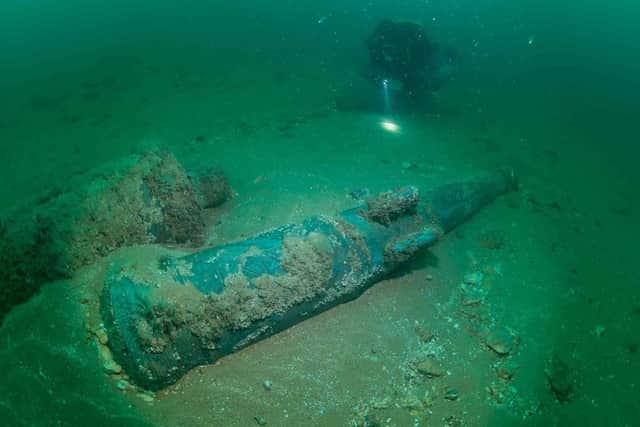Shipwreck off UK coast identified as 17th century Dutch warship scientists and archaeologists confirm
and live on Freeview channel 276
The remains of a shipwreck located off the coast of Sussex has been identified as a 17th century Dutch warship. The ship, named ‘Klein Hollandia’, has been identified by scientists and researchers at Historic England, Cultural Heritage Agency of the Netherlands and the Nautical Archaeology Society.
Over the past year, specialists from Historic England, Cultural Heritage Agency of the Netherlands (RCE) and the Nautical Archaeology Society have been working on its identification through evidence gathered during dives of the wreck by a team of professional and volunteer divers, as well as through archival research and dendrochronological (tree ring) analysis of the wood samples.
Advertisement
Hide AdAdvertisement
Hide AdThe ‘Klein Hollandia’ was first discovered in 2019. It was deemed to be so important that it was given a special protective status under the Protection of Wrecks Act 1973, the highest level of protection.
Only licensed divers are allowed to dive to the wreck site. The wreck was discovered by Eastbourne dive operator David Ronnan and reported to Historic England. David Ronnan and Mark Beattie-Edwards from the Nautical Archaeology Society are the licensees and have been investigating the wreck since its discovery.
Lord Parkinson of Whitley Bay, Heritage Minister: “The identification of the ‘Klein Hollandia’ offers a glimpse back into the seventeenth century, giving us a chance to learn more about the maritime history of this period and to uncover treasures which have been underwater for hundreds of years.
“I am very pleased that thanks to this partnership between the UK and the Netherlands, we have been able to solve some of the mysteries linked to this wreck – and to protect it for future generations to continue to research.”
Advertisement
Hide AdAdvertisement
Hide AdDuncan Wilson, chief executive at Historic England said: “Investigating this internationally-significant Protected Wreck site has been an excellent example of partnership working between Historic England, Cultural Heritage Agency of the Netherlands and the Nautical Archaeology Society.
“We’re delighted that Historic England’s material scientists have played a key part in solving the mystery of this shipwreck’s previously hidden identity. Uncovering the story of the warship ‘Klein Hollandia’ opens up another fascinating chapter in the already rich, shared maritime history between the UK and the Netherlands.”
The Klein Hollandia


The Klein Hollandia was owned by the Admilatry of Rotterdam and was involved in every major battle during the Anglo-Dutch War (1665-67).
The ship survived the war, but was sent to its watery grave in 1672. According to Historic England, the ship was part of the squadron of Admiral de Haese to escort the Smyrna fleet while sailing from the Mediterranean into the English Channel, en-route to the Netherlands. At the Isle of Wight, the squadron was attacked by an English squadron under Admiral Holmes.
Advertisement
Hide AdAdvertisement
Hide AdA fierce battle broke out on the second day, March 23, resulting in the Klein Hollandia being damaged severely. The commander of the ship, Jan Van Nes was killed in action. The ship was boarded and conquered by the English, but shortly after the Klein Hollandia sank with both English and Dutch sailors on board.
